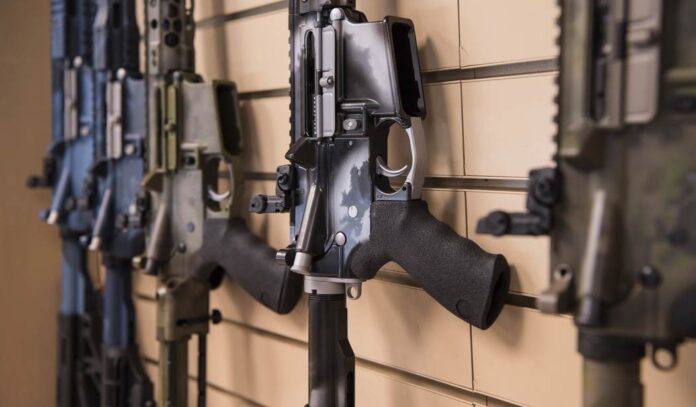I get that people want to address mass murders involving firearms, what most folks would call a “mass shooting.” I want to address them, too, so I totally get it.
I just don’t think gun control will actually address them.
But not everyone agrees. I get that.
However, in the search for something, some folks lock onto some really ridiculous ideas. Unsurprisingly, one of those ridiculous ideas comes to us via Slate–where a lot of idiotic arguments can be found–and it involves hunting and mass murders.
Yeah, seriously.
But hey, maybe it’s got a viable take on the issue.
Just don’t hold your breath.
But these debates miss a lot. Owning a gun for the purposes of hunting is a fundamentally different thing than owning one for the purpose of killing another person. When I talked to media outlets a few years ago, in the aftermath of the mass shooting in Lewiston, Maine (where I work), puzzling over why the state has a high rate of gun ownership but (generally speaking) low rates of gun crime, I was overlooking the reality that a large portion of those guns are likely meant for killing wildlife. What’s the difference? I would argue quite a lot.
First, virtually all hunters must take a safety or education course. I distinctly remember mine, sitting next to my father, leafing through the fluorescent orange hunter safety book and listening to the presenter. I was impressed by the danger of guns and the importance of ensuring they are kept locked up when not in use.
Second, there are laws that apply to hunting that do not apply to other types of gun carrying. For example, in Maine, when driving the logging roads looking for game, I cannot have a weapon loaded in my vehicle. If we spot a partridge, we must stop the vehicle, step outside of it, load, and then fire. The purpose of this regulation is, of course, to promote safety, a concept that is of utmost concern for hunters. But if you are carrying a gun for nonhunting purposes? Then it’s fine to have it loaded in your car. It’s literally written into the legislation on guns and vehicles in Maine. So if you want to shoot a deer, you have to be safe about it. If you want to shoot a person, throw caution to the wind.
Third, there is a symbolic difference between owning weapons for hunting and owning weapons for sport or defense. The former is not infused with the implication of violence against humans. The latter carries with it that possibility. There are attitudinal and practical reasons why this matters. When I buy a gun for hunting, the potential that a human being may be harmed by that weapon is a horrifying thought. When not hunting, the gun hangs in a carrying case, with a lock. Contrast that with a handgun bought for the purposes of self-defense. By definition, that gun is purchased with the thought that another human may be its target. And for a gun possessed for self-defense purposes, having the weapon locked and out of reach may defeat those purposes.
What this has to do with mass public shootings is beyond me.
This information is presented as if it’s relevant, but let’s understand something about mass killers. They aren’t accidentally killing dozens of people because they’re unaware that their gun is dangerous. If homicide laws won’t stop them, laws preventing you from driving down the road with a loaded gun won’t, either. And that third paragraph is pure stupidity.
First, whether there’s a “symbolic difference” between guns bought for hunting and those bought for self-defense is irrelevant. Symbolism may play a role in a mass murder, but that’s going to impact the target more often than not.
The author does go on to acknowledge that the data providing any links between hunting and violent crime is largely non-existent and much of the arguments presented trying to connect the two are full of nonsense.
But here he is trying also to make some kind of connection. Especially in his conclusion:
In the end, much more research is needed on the link between hunting and crime. But one thing is clear: The current state of the debate on guns and crime is in need of more context regarding the types of guns in circulation and the reasons why people own them. My friend Jack is right that a gun lying on a coffee table won’t commit a crime. The real question is whether a gun used for hunting is less likely to be used for a crime than other types of weapons. There is sufficient reason to believe it would be.
Is there?
Oh, right now, what most would term as hunting weapons aren’t often used in crime. For the most part, anyway.
But let’s say you took handguns off the table entirely. Let’s say they just vanished tomorrow. Everyone’s gun just up and disappears regardless of who you are or how you obtained it.
Would violent criminals stop being violent criminals? Not only would they not stop being violent, but they’d also still obtain guns. They’d start using things like shotguns, for example. Take a pump-action or double-barrelled shotgun, saw the barrel down, lop off the stock, and you’ve got something you could hide in a lot of ways.
Yet both of those are hunting guns.
See, when you spend your time trying to focus on the tool and not the tool using it, you tend to forget that for someone who is properly motivated, any gun can be pressed into service. Let’s not forget that the University of Texas tower shooting is still the fourth most bloody school shooting in American history. Most of the firearms used in that shooting would be considered hunting weapons. It didn’t stop the attack from happening.
That’s the problem with focusing on guns.
Unfortunately, too many people seem unable to wrap their heads around the kind of evil that would take another person’s life. That’s probably a good thing, for the most part, but one downside of that is that they honestly believe if you just leave certain guns available and ban others, the problem will go away.
No, the problem will shift, but now you’ve already set the stage for banning things.




